BusinessEurope Headlines No. 2021-22
Exchange of views with Vice-President Šefčovič on EU-UK relations
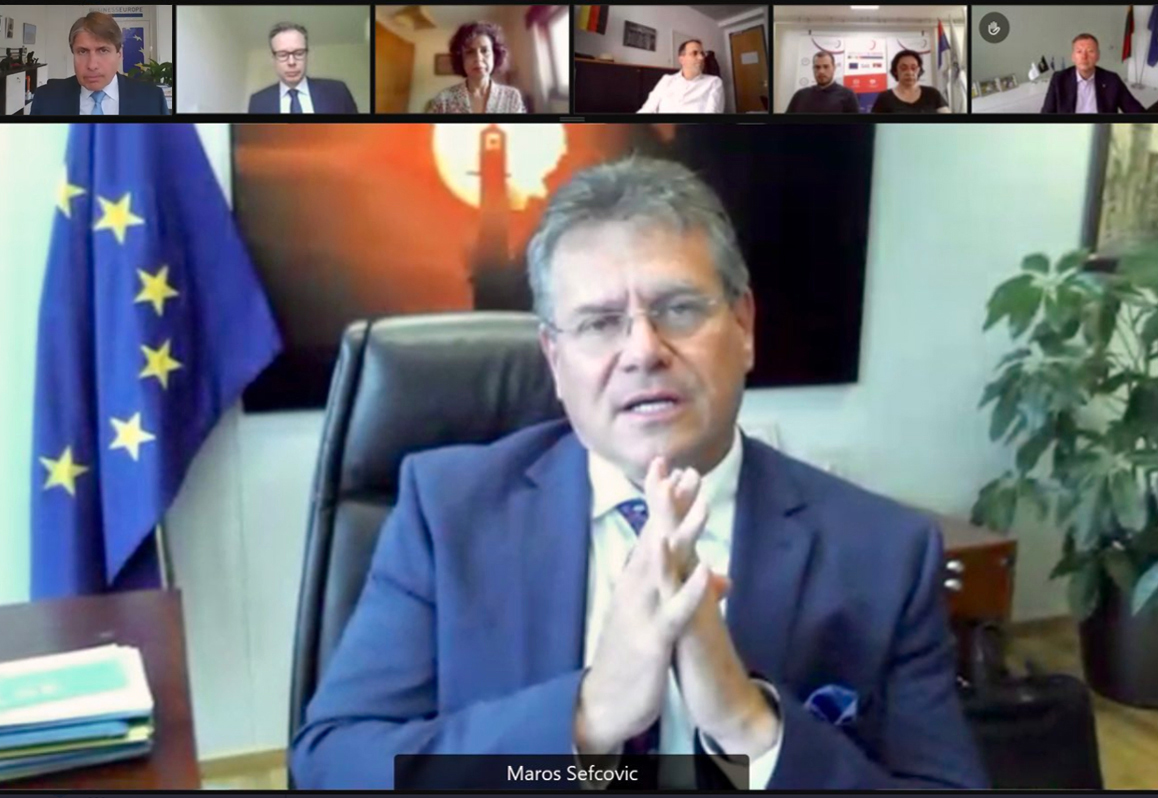
“The successful conclusion of the EU-UK trade and cooperation agreement in late 2020 came as an enormous relief to the European business community. Nonetheless, the adaptation to the post-Brexit situation has not always been smooth for companies in the EU and the UK, and many challenges remain”, said Markus J. Beyrer, Director General of BusinessEurope, at a virtual discussion with European Commission Vice-President Maroš Šefčovič. The event, which took place on 25 June, was an opportunity for the Presidents and Directors General of BusinessEurope member federations and members of the BusinessEurope EU-UK Task Force to exchange views with Vice-President Sefcovic on EU-UK relations half a year after the end of the transition period. “BusinessEurope is particularly concerned about the tensions in Northern Ireland. To avoid any further escalation, it is now key that the EU and the UK redouble their efforts to agree on workable and pragmatic long-term solutions”, Beyrer pointed out. Any solution, he added, must be in line with the Northern Ireland Protocol and respect the Good Friday Agreement, while safeguarding the integrity of the EU Single Market.
Contact: Benedikt Wiedenhofer
Video message
Priorities for the Slovenian Presidency
The Slovenian Presidency of the Council of the EU starts today. It will have the historic task of approving the national recovery and resilience plans. Watch our Director General Markus J. Beyrer speaking about the priorities for European companies.
Implications of Chinese foreign direct investment in Europe
 BusinessEurope hosted the virtual roundtable discussion “Chinese FDI in the European Union: the implications for European business and policymaking”, on 30 June. In this webinar, Rhodium Group and the Mercator Institute for China Studies (MERICS) presented the latest edition of their report “Chinese FDI in Europe: 2020 Update”. The report sheds light on how persistent disruption from Covid-19, high barriers to outward capital flows in China and increasing regulatory constraints to foreign investment in Europe have led to lower Chinese investment on the continent. Their presentation was followed by a lively discussion with BusinessEurope’s members on the implications of these latest developments for businesses and policymakers in the EU. “In view of current EU policy initiatives such as the Foreign Subsidy Instrument and updated FDI screening mechanisms, it will be important to assess which of the recent trends in Chinese FDI are linked to the exceptional circumstances we have faced due to the COVID-19 pandemic, and which are likely to be of a more permanent nature”, said Luisa Santos, Deputy Director General of BusinessEurope, to conclude the event.
BusinessEurope hosted the virtual roundtable discussion “Chinese FDI in the European Union: the implications for European business and policymaking”, on 30 June. In this webinar, Rhodium Group and the Mercator Institute for China Studies (MERICS) presented the latest edition of their report “Chinese FDI in Europe: 2020 Update”. The report sheds light on how persistent disruption from Covid-19, high barriers to outward capital flows in China and increasing regulatory constraints to foreign investment in Europe have led to lower Chinese investment on the continent. Their presentation was followed by a lively discussion with BusinessEurope’s members on the implications of these latest developments for businesses and policymakers in the EU. “In view of current EU policy initiatives such as the Foreign Subsidy Instrument and updated FDI screening mechanisms, it will be important to assess which of the recent trends in Chinese FDI are linked to the exceptional circumstances we have faced due to the COVID-19 pandemic, and which are likely to be of a more permanent nature”, said Luisa Santos, Deputy Director General of BusinessEurope, to conclude the event.
Contact: Benedikt Wiedenhofer
Open EU trade: key for digital transformation
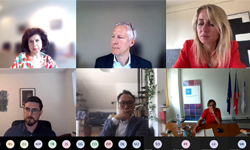 Luisa Santos, Deputy Director General of BusinessEurope, participated at the “Roundtable on the Open Strategic Autonomy and International Partnerships – Building Safe Data Spaces”, organised by the Confederation of Industry of the Czech Republic (SPCR) on 29 June. In her intervention, she argued in favour of finding the right balance between, on the one hand, openness and resilience, and on the other hand openness and privacy. “In times of crises, governments are tempted to take a number of measures to address the problem in the short term, without considering the mid-to long-term implications of certain measures, which may be harmful for the economy. There is a lot of discussion nowadays about what is strategic and what is not, but the key does not lie in adopting different types of restrictions, but on ensuring an enabling environment for business to thrive”, Santos stated. She highlighted the importance of supporting more diversified supply chains and that trade – for instance Free Trade Agreements – can help in this process. In this regard, an ambitious EU approach to e-commerce and data flows in particular is necessary. The provisions included in the EU-UK Trade and Cooperation Agreement are a positive achievement. More should be done at the multilateral level as well and the negotiations on a Joint Statement Initiative on e-commerce are an important step. “We understand that discussions on global rules are complex. Cooperation with our partners, such as the U.S., can help in the meantime and we welcome the creation of the Trade and Technology Council”, concluded Santos.
Luisa Santos, Deputy Director General of BusinessEurope, participated at the “Roundtable on the Open Strategic Autonomy and International Partnerships – Building Safe Data Spaces”, organised by the Confederation of Industry of the Czech Republic (SPCR) on 29 June. In her intervention, she argued in favour of finding the right balance between, on the one hand, openness and resilience, and on the other hand openness and privacy. “In times of crises, governments are tempted to take a number of measures to address the problem in the short term, without considering the mid-to long-term implications of certain measures, which may be harmful for the economy. There is a lot of discussion nowadays about what is strategic and what is not, but the key does not lie in adopting different types of restrictions, but on ensuring an enabling environment for business to thrive”, Santos stated. She highlighted the importance of supporting more diversified supply chains and that trade – for instance Free Trade Agreements – can help in this process. In this regard, an ambitious EU approach to e-commerce and data flows in particular is necessary. The provisions included in the EU-UK Trade and Cooperation Agreement are a positive achievement. More should be done at the multilateral level as well and the negotiations on a Joint Statement Initiative on e-commerce are an important step. “We understand that discussions on global rules are complex. Cooperation with our partners, such as the U.S., can help in the meantime and we welcome the creation of the Trade and Technology Council”, concluded Santos.
Contact: Sofia Bournou
Dialogue with WTO Director General
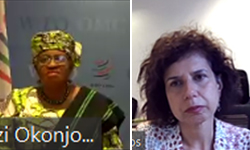 On 30 June, the Trade Bridges event – “Bringing the WTO to you” took place, with global business leaders having the opportunity to debate with Ngozi Okonjo-Iweala, Director General of the World Trade Organisation (WTO) about issues that will influence future discussions in the WTO. The event focused on three main areas – (1) SMEs, Business and Trade Development; (2) Agriculture, Food Security and Supply Chain Resilience; and (3) Inclusive Trade. Luisa Santos, Deputy Director General of BusinessEurope, moderated the first panel, on SMEs, Business and Trade Development. Representatives from the U.S., Canada, Africa and the Caribbean shared their priorities on how the WTO can concretely deliver on assisting SMEs to take advantage of international trade. Panellists highlighted that clear rules and better access to finance are critical to facilitate trade by SMEs. Efforts at the national level are key and governments should raise awareness on the tools that are in place to help SMEs but also ensure the effective implementation of agreed rules. The horizontal work in the WTO is important, as the needs of SMEs should be reflected on all discussions and negotiations – from agriculture and fisheries to rules on services and e-commerce. At the same time, they acknowledged the on-going discussions under a Joint Statement Initiative on Micro and Small and Medium-Sized Enterprises (MSMEs) that further promotes the SME dimension in the work of the WTO. Concrete outcomes are expected in the upcoming 12th WTO Ministerial Conference that takes place at the end of the year in Geneva.
On 30 June, the Trade Bridges event – “Bringing the WTO to you” took place, with global business leaders having the opportunity to debate with Ngozi Okonjo-Iweala, Director General of the World Trade Organisation (WTO) about issues that will influence future discussions in the WTO. The event focused on three main areas – (1) SMEs, Business and Trade Development; (2) Agriculture, Food Security and Supply Chain Resilience; and (3) Inclusive Trade. Luisa Santos, Deputy Director General of BusinessEurope, moderated the first panel, on SMEs, Business and Trade Development. Representatives from the U.S., Canada, Africa and the Caribbean shared their priorities on how the WTO can concretely deliver on assisting SMEs to take advantage of international trade. Panellists highlighted that clear rules and better access to finance are critical to facilitate trade by SMEs. Efforts at the national level are key and governments should raise awareness on the tools that are in place to help SMEs but also ensure the effective implementation of agreed rules. The horizontal work in the WTO is important, as the needs of SMEs should be reflected on all discussions and negotiations – from agriculture and fisheries to rules on services and e-commerce. At the same time, they acknowledged the on-going discussions under a Joint Statement Initiative on Micro and Small and Medium-Sized Enterprises (MSMEs) that further promotes the SME dimension in the work of the WTO. Concrete outcomes are expected in the upcoming 12th WTO Ministerial Conference that takes place at the end of the year in Geneva.
Contact: Sofia Bournou, Elena Suárez
Future due diligence framework needs to be workable
 Companies understand the importance of good corporate governance and of mitigating risks that can occur in the supply chains, but future EU rules must be workable and provide legal certainty. Enterprises cannot be made liable for what is beyond their control. These messages were voiced by Pedro Oliveira, BusinessEurope’s Legal Director during Politico’s Competitive Europe Summit on 30 June. He added that if the balance is not right, companies will become risk averse and tend to pull out of other markets, leaving the space open to competitors. This will not serve the intended objectives of EU action. European companies' foreign investment is essential for local communities in third states and they carry with them the values and standards upheld by the EU. It is also essential that EU and Member States create an enabling environment to help implement the diligence, for example, by offering support and information on the situation on the ground.
Companies understand the importance of good corporate governance and of mitigating risks that can occur in the supply chains, but future EU rules must be workable and provide legal certainty. Enterprises cannot be made liable for what is beyond their control. These messages were voiced by Pedro Oliveira, BusinessEurope’s Legal Director during Politico’s Competitive Europe Summit on 30 June. He added that if the balance is not right, companies will become risk averse and tend to pull out of other markets, leaving the space open to competitors. This will not serve the intended objectives of EU action. European companies' foreign investment is essential for local communities in third states and they carry with them the values and standards upheld by the EU. It is also essential that EU and Member States create an enabling environment to help implement the diligence, for example, by offering support and information on the situation on the ground.
Contact: Pedro Oliveira
Cooperation between businesses and universities should address skill needs
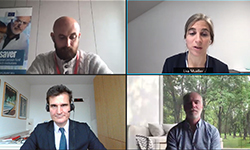 Strengthened cooperation between businesses and universities should focus on embedding the skills needed by companies into degrees, including research degrees. This is particularly important regarding the design and delivery of curricula. This will help to facilitate the transition of researchers between academia and business, while helping companies to address their skills needs, especially in science, technology, engineering, and mathematics (STEM) and digital skills. Industrial PhDs in particular need to be better promoted as they have a key role to strengthen companies’ innovation potential. An improved cooperation between universities and business will also improve graduates’ learning outcomes and employability, contributing to a better match between skills and jobs across Europe. These were the key messages given by Maxime Cerutti, Director of Social Affairs, during a seminar organised as part of the European Research and Innovation Days on 24 June.
Strengthened cooperation between businesses and universities should focus on embedding the skills needed by companies into degrees, including research degrees. This is particularly important regarding the design and delivery of curricula. This will help to facilitate the transition of researchers between academia and business, while helping companies to address their skills needs, especially in science, technology, engineering, and mathematics (STEM) and digital skills. Industrial PhDs in particular need to be better promoted as they have a key role to strengthen companies’ innovation potential. An improved cooperation between universities and business will also improve graduates’ learning outcomes and employability, contributing to a better match between skills and jobs across Europe. These were the key messages given by Maxime Cerutti, Director of Social Affairs, during a seminar organised as part of the European Research and Innovation Days on 24 June.
Contact: Robert Plummer
Strengthening cooperation between Public Employment Services and European social partners
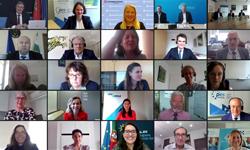 The post-Covid economic environment brings along restructuring and structural changes. On the labour markets, the current situation combines high levels of inactivity, unemployment, underemployment, and growing skills shortages. In this context, supporting job creation and a better match between jobs and skills, notably through improved job-to-job transitions, are crucial priorities towards better functioning labour markets. In particular, in-work benefits can play an important role to attract the inactive to the labour markets. It is a challenge across Europe that Public Employment Services (PES) become more responsive to employers and workers needs. That is why an improved cooperation with the European social partners is so essential today, for labour markets to recover quickly from the Covid crisis. These were the key messages of Maxime Cerutti, BusinessEurope Social Affairs Director, during his intervention at the European PES Network virtual board meeting that took place on 24 June. BusinessEurope also supports current work by the PES network to improve the role of employment services to underpin the greening of our economies in a way that supports employment.
The post-Covid economic environment brings along restructuring and structural changes. On the labour markets, the current situation combines high levels of inactivity, unemployment, underemployment, and growing skills shortages. In this context, supporting job creation and a better match between jobs and skills, notably through improved job-to-job transitions, are crucial priorities towards better functioning labour markets. In particular, in-work benefits can play an important role to attract the inactive to the labour markets. It is a challenge across Europe that Public Employment Services (PES) become more responsive to employers and workers needs. That is why an improved cooperation with the European social partners is so essential today, for labour markets to recover quickly from the Covid crisis. These were the key messages of Maxime Cerutti, BusinessEurope Social Affairs Director, during his intervention at the European PES Network virtual board meeting that took place on 24 June. BusinessEurope also supports current work by the PES network to improve the role of employment services to underpin the greening of our economies in a way that supports employment.
Contact: Anna Kwiatkiewicz-Mory
Photo copyright: European Union/Portuguese Presidency of the EU 2021
Joint industry statement in support of EU-Mercosur deal
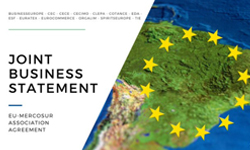 On 28 June, on the second anniversary of the political agreement reached by the European Union and the Mercosur countries for an ambitious, balanced and comprehensive trade agreement, BusinessEurope and other industry associations have published a joint business statement calling for the swift ratification of the EU-Mercosur deal. We trust that the enormous opportunities from an economic, geopolitical and sustainability point of view, will help gather the necessary political support in the Council and the European Parliament.
On 28 June, on the second anniversary of the political agreement reached by the European Union and the Mercosur countries for an ambitious, balanced and comprehensive trade agreement, BusinessEurope and other industry associations have published a joint business statement calling for the swift ratification of the EU-Mercosur deal. We trust that the enormous opportunities from an economic, geopolitical and sustainability point of view, will help gather the necessary political support in the Council and the European Parliament.
![]() Contact: Eleonora Catella
Contact: Eleonora Catella
The role of investment in achieving development objectives
 On 24 June, Deputy Director Eleonora Catella participated in an event organised by the European Chamber of Commerce in China following the publication of the 27th Global Trade Alert Report “Advancing Sustainable Development with FDI - Why Policy Must Be Reset”. She highlighted that a strong involvement of the private sector towards achieving Sustainable Development Goals is essential, and the presence of EU companies in foreign markets has a transformative effect: they bring not only technological know-how or business expertise, but their sets of values and corporate practices. “This helps creating jobs and entrepreneurial opportunities, enabling knowledge spill-overs, generating public revenue for governments and providing a variety of products, services and concrete solutions to consumers and other businesses: all this contributes to achieving the SDGs”, Catella said. However, for foreign direct investment (FDI) to contribute to Sustainable Development Goals, for example focusing on sustainable infrastructure and the green transition, the right conditions must be present. The focus must be on eliminating political barriers to FDI, and on increasing legal clarity, stability and predictability. “Maintaining an open and conducive environment for both inwards and outwards investment is crucial. The policy framework, as well as the investment and the business climate conditions in which companies operate, are a crucial aspect”, Catella concluded.
On 24 June, Deputy Director Eleonora Catella participated in an event organised by the European Chamber of Commerce in China following the publication of the 27th Global Trade Alert Report “Advancing Sustainable Development with FDI - Why Policy Must Be Reset”. She highlighted that a strong involvement of the private sector towards achieving Sustainable Development Goals is essential, and the presence of EU companies in foreign markets has a transformative effect: they bring not only technological know-how or business expertise, but their sets of values and corporate practices. “This helps creating jobs and entrepreneurial opportunities, enabling knowledge spill-overs, generating public revenue for governments and providing a variety of products, services and concrete solutions to consumers and other businesses: all this contributes to achieving the SDGs”, Catella said. However, for foreign direct investment (FDI) to contribute to Sustainable Development Goals, for example focusing on sustainable infrastructure and the green transition, the right conditions must be present. The focus must be on eliminating political barriers to FDI, and on increasing legal clarity, stability and predictability. “Maintaining an open and conducive environment for both inwards and outwards investment is crucial. The policy framework, as well as the investment and the business climate conditions in which companies operate, are a crucial aspect”, Catella concluded.
Contact: Eleonora Catella
Calendar 
- 18 August-3 September: European Forum Alpbach 2021
- 19-22 September: XXII World Congress on Safety and Health at Work
Not yet a subscriber? Register here.
Reminder: please have a look at our privacy policy